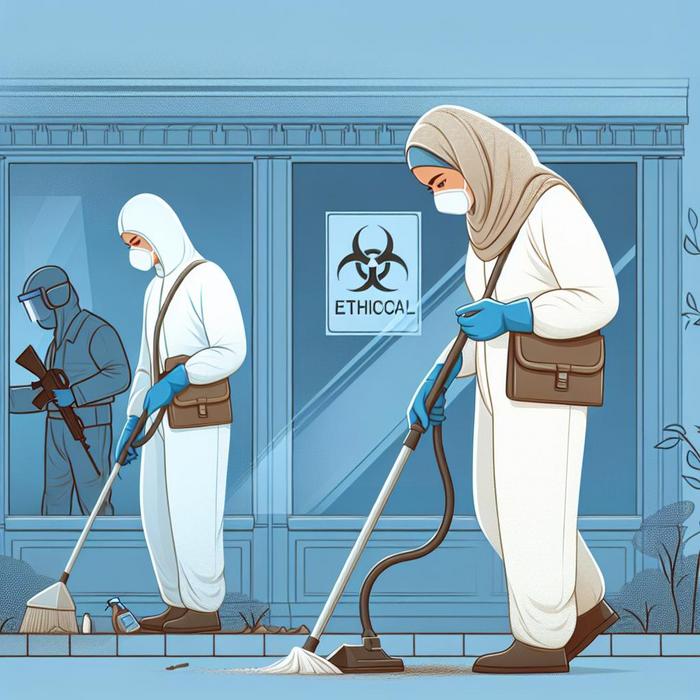Understanding the Importance of Fair Crime Scene Cleanup Procedures
When a traumatic event such as a crime or an accident unfolds in a property, the aftermath can be a jarring reality for owners and managers. The need for crime scene cleanup services becomes paramount, but many worry about two aspects: the efficiency of the process and the sensitivity of the teams involved. Amidst the chaos, property owners can rest assured, knowing that professional cleanup services are committed to ensuring fair crime scene cleanup procedures, treating every situation with the utmost respect and care.
Understanding the ethical cleanup approach is crucial to ensure a smooth restoration process, both physically and emotionally. While emotional wounds might take time to heal, a fair and ethical cleanup process can ease some of the practical burdens property owners face, keeping their well-being at the center of operations.
Assurance of Comprehensive and Ethical Cleanup
An effective crime scene cleanup goes beyond just cleaning and disinfecting the property. It also accounts for the psychological and emotional aspects of those affected by the unfortunate events. Fair crime scene cleanup services focus equally on the technical cleanliness of the site and the well-being of its occupants, ensuring compassionate and ethical cleanup after a traumatic event.
Highly trained professionals in companies like SceneCleanMN, adopt a strong commitment to health, safety, and environmental regulations, ensuring composure and professionalism throughout the cleanup process. This balanced approach aids in swiftly restoring normalcy and peace.
Elements of a Fair and Thorough Cleanup Process
While each cleanup process is unique and requires a tailored approach, certain universal aspects ensure an ethical cleanup. They include:
- Damage Assessment and Estimation: The cleanup team accurately assesses the extent of the damage and estimates the cleanup requirements, ensuring comprehensive service and avoiding unnecessary costs.
- Advanced Restoration Techniques: Using cutting-edge equipment and advanced restoration techniques, professionals ensure the affected area is thoroughly cleaned and safe.
- Adherence to Regulations: Following all local and national regulations, such as those stipulated in the crime scene documentation guide, adds credibility to the process, ensuring that it is conducted ethically and legally.
- Respecting Privacy: Privacy is central to an ethical cleanup, with professionals prioritizing discretion during cleanup processes. More insights can be found on ensuring your privacy during crime scene cleanup operations.
- Supportive Approach: A supportive approach, like support through recovery with trauma cleanup services, can be highly beneficial to property owners navigating recovery.
Importance of Insurance and Legal Compliance in Crime Scene Cleanup
Many property owners might inaccurately perceive the crime scene cleanup process as invasive or financially draining. However, service providers ensure adherence to all insurance and legal guidelines during an ethical cleanup process. This understanding can lessen the financial burden on the property owner and reinforce their trust in the services provided.
Moreover, most homeowners’ and commercial insurance policies cover the costs of crime scene cleanup, ensuring a sense of security during difficult times. For more information, click here to understand who pays for a crime scene cleanup.
In conclusion, the fair crime scene cleanup process aims to restore normalcy after a distressing event, offering comprehensive and ethical cleanup services. Understanding this process can help affected individuals recognize the value of selecting professional and empathetic restoration services, easing the journey of recovery.
Understanding the Role of Crisis Management in Crime Scene Cleanup
Crises are inherently stressful and require a coordinated response to manage effectively. This becomes particularly true in the context of crime scene cleanup, where trauma and urgency often coexist. The value of a proactive crisis management strategy is often underestimated, but it is crucial to ensuring successful restoration operations.
Professional cleanup services are trained to manage crises efficiently, coordinating the various elements of the cleanup process while ensuring the emotional wellbeing of everyone involved. The situation demands quick decision-making, clear communication, and proper utilization of resources, without losing sight of the sensitivities inherent to the situation.
For instance, the emotional and physical challenges associated with trauma cleanup are considerable, necessitating informed crisis management tactics to reduce stress and establish control over the situation.
Managing Emergency Situations with Skilled Restorations
Emergencies demand fast reaction times and efficient solutions. In the wake of a crime, property owners can find themselves faced with the daunting task of restoring their premises to a livable or workable condition. It’s here that the skills and experience of professional cleanup services can prove invaluable.
Understanding the urgency of the situation, these services operate on a 24/7 basis, providing immediate response and fast restorations. Their trained professionals use the latest equipment to handle hazardous situations swiftly, while adhering to the regulations and safety protocols.
Customer Communication During Crime Scene Cleanup
Open and effective communication is a key element of a fair and comprehensive crime scene cleanup process. Clear dialogue can decrease confusion and anxiety for the property owners and can increase their trust in the cleanup service.
Professional crime scene cleanup services prioritize effective communication, keeping property owners informed about every step in the cleanup process, from damage assessment to the final stages of restoration. Particularly in situations that involve trauma, clear communication aids in helping individuals better understand the process and feel more at ease.
For more information on the importance of customer communication during crisis management, visit here.
Crime scene cleanups often involve dealing with biohazards such as blood and other bodily fluids, presenting significant health and safety risks. Professionals in this field are trained to handle these hazards, thereby ensuring the safety of everyone involved.
Additionally, crime scene cleanup teams also adhere to strict environmental regulations to ensure that biohazardous waste is disposed of correctly, mitigating any potential environmental harm.
By considering these aspects, service providers can assure property owners that all safety measures are taken into account during the cleanup process. If you’re looking to understand more about environmental and health safety protocols during crime scene cleanup, visit here.
Final Points on the Importance of Fair Crime Scene Cleanup Procedures
The process of crime scene cleanup is about more than just technical cleaning and restoration. It’s about ensuring that every aspect of the situation, whether emotional, financial or environmental, is handled with care, efficiency, and urgency.
Professional cleanup and restoration services understand the gravity of these situations and strive to provide an ethical and fair process that focuses as much on the emotional recovery of those affected as it does on returning the affected area to its pre-incident state.
So, whether you’re a property owner dealing with the aftermath of a crime or an individual looking to understand more about crime scene cleanup, it is worth noting the ethical and comprehensive procedures adopted by the professionals in this field. Their work ensures that during difficult times, you can focus on emotional recovery, leaving the physical restoration to the experts.

